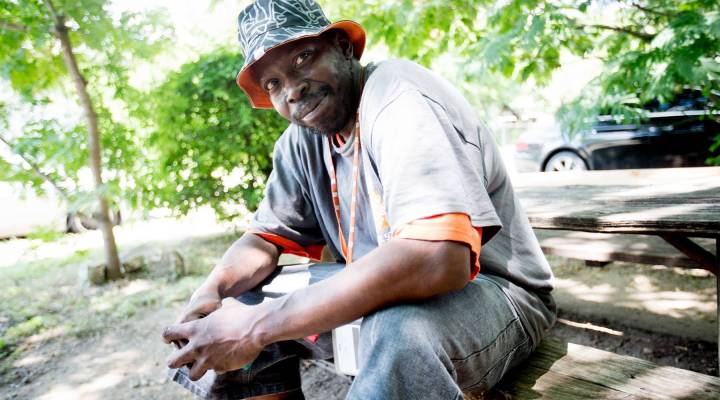
By foot, by train, by bus: when the total daily commute stretches to six hours
By foot, by train, by bus: when the total daily commute stretches to six hours

Nationwide, most people still commute to work by car; 85 percent according to the 2016 census. Some people don’t have that option. People who don’t own vehicles often rely on public transportation, and in Dallas, 54 percent of people who do that spend at least 45 minutes commuting, each way.
One Texan has a commute that’s considerably longer. Chris Crowley can’t afford a car. So every afternoon his commute starts with a walk from his house to a light rail station about a mile away. This summer, temperatures have reached 110 degrees.
“I just keep on trucking along,” he said.
Crowley boards one train, then another, then catches a bus, then a second bus to reach his job at a Home Depot Distribution Center 15 miles away. All told it takes him three hours to get there, and that’s just one way.
“My job starts at 4:30 p.m. I actually have to leave the house at like 12:45 p.m.,” Crowley said.
That overnight shift ends at 3:00 a.m. During the work week, Crowley says he maxes out at four hours of sleep a night. That’s two hours less than his daily commute. Still, the 39-year-old sees the upside of all that walking, and what it does for his health.
“I got a lot more energy, lighter on my feet. Little more stamina, so you know it’s, can’t complain on it,” Crowley said.
He likes his job and the pay is good, $14 an hour plus health and retirement benefits, compared to the $9 an hour plus health he was earning before at Target. Moving closer to work isn’t really an option because he shares a house with his parents in the neighborhood he’s always called home.
“This is my roost. I was born and raised over in this neighborhood,” Crowley said. “And I’ve always said, I wanted to die in this neighborhood.”
Crowley’s making more money now than he was this time last year, but after kicking in for rent, buying food, paying his $55 phone bill and $359 in child support, he’s only able put aside about $50 a month. He’d like to save enough to buy a car outright, with no monthly payment.
“I just never wanted to go there,” Crowley said. “I always wanted to buy me a car, not have to worry about spending extra money for the car note, that way that money can go in my pocket for something else, you know?”
The commute costs Crowley just about $80 a month. What it really costs him, is time.
“That’s time taken away from their families. It’s time where they can’t actually look for or have another job. It’s time where they couldn’t be getting an additional education or certificate to be able to advance themselves,” Frances Deviney with the Austin-based Center for Public Policy Priorities explained.
Many well-paid jobs are clustered far from convenient public transit routes, she said, forcing people without cars to spend a lot of time mapping out a way to work.
“They may have to travel a really long way to get the job that actually pays a little bit of a better wage,” Deviney said.
Crowley puts up with the long commute, because he said he sees potential in this job.
“Right now like I said, I’m moving merchandise around, and unloading trucks. But you can move up easily to a manager or an assistant manager position,” Crowley said. “And I’ve seen the dudes that are doing that, and they’ve been there for 10, 15, 20 years.”
He can see this company being the one he sticks with for the rest of his working days. He said he hopes for a promotion, a healthy 401(k) and one day, “I want to buy me some land. I really want to buy me some land, put me a house on it, and this is mine. This is mine, this is my family’s, this is for my son, his son can have it,” Crowley said.
As much as he believes in that dream, reality is expensive.
“You think everything, you know, you’re in the clear, and oh, you know, I’m making pretty good money, and yeah, ok. But stuff still costs, and it’s only getting higher, you know? It’s difficult, but hey, it’s life, you know? We either deal with it, or you don’t,” Crowley said.
And that’s what he holds onto as he jams a hat on his head, grabs a jug of iced sweet tea and takes the first few steps of that three hour commute.
There’s a lot happening in the world. Through it all, Marketplace is here for you.
You rely on Marketplace to break down the world’s events and tell you how it affects you in a fact-based, approachable way. We rely on your financial support to keep making that possible.
Your donation today powers the independent journalism that you rely on. For just $5/month, you can help sustain Marketplace so we can keep reporting on the things that matter to you.


















